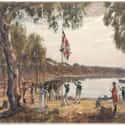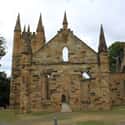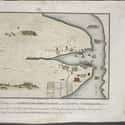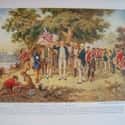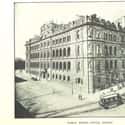-
(#7) Little Was Known About Australia At The Time, So Settling There Was Especially Risky
When Phillip landed in Australia, hardly anything was known about the new land. Colonizers had little idea what they would find in terms of food or terrain. They were unaware of the attitude and quantity of the indigenous people. In fact, they weren't even certain of the climate in their new home.
When it came to the convicts, the lack of knowledge was considered a positive. British officials believed fear of the unknown would stop convicts from committing more wrongs in their new home. However, in terms of establishing a colony, the lack of knowledge meant convicts and free men had to work together to breed success from their new settlement.
-
(#10) 160,000 Convicts Were Transported To Penal Colonies Around Australia
From the first penal settlement in 1788 to the abolishment of convict transportation in 1868, around 160,000 convicts were transferred from England to Australia. After the success of Port Jackson, convict settlements were established across the country and shipments of prisoners became a regular occurrence. Another convict colony was established at Sullivans Cove in the northern part of the island. Convicts first arrived there in 1804, and a regular influx of lawbreakers to this colony began in 1818.
As convicts became regular settlers in the new land, several settlements were established as a place of secondary punishment. If a convict committed a new offense while in Australia, they were transported again to these particular locations for further punishment. These secondary settlements included Norfolk Island, Macquarie Harbour, Port Macquarie, and Newcastle.
Certain convict establishments focused more intensely on punishment, while others emphasized reformation. Wherever convicts ended up, however, most settlements offered an opportunity for freedom and normality. After serving their sentences, people could live a life of independence on new land with plenty of opportunities to make money. Reformation was possible in most cases, and many convicts went on to live completely normal lives.
-

(#6) Eleven British Ships Made Up The First Fleet
Eleven British ships made up the first fleet that brought new settlers to Port Jackson. Six of the ships were convict transports, three were store ships, and two were naval escorts.
In all, the fleet brought 736 convicts and 1,000 total settlers to Australia. The voyage took eight long months before the colonists reached their new home.
-
(#8) The First Settlement Provided The Same Opportunities For Convicts And Free Men
Phillip recognized the many challenges associated with creating a successful colony on the other side of the world. He realized the success of his settlement demanded the tireless efforts of all men involved, not just the free men. With that mission in mind, he sought to reform his convict charges, rather than simply disciplining them.
The Port Jackson colony struggled to survive at the start. Many of the settlers were unskilled in farming. Their lack of expertise combined with an unfamiliar climate led to failed crops and a lack of food to satisfy all the settlers. However, Phillip insisted that convicts and free men get the same rations, no matter how much or how little there was at the time. In addition, he gifted land to convicts he deemed deserving, giving them a chance to truly start over in the new world. By valuing the success of his convicts as much as that of any other settler, Phillip ensured his colony survived.
-
(#4) Captain James Cook Claimed Australia As A British Colony In 1770
The major conflict of the American Revolution started in 1775, but England had already moved to expand its rule beyond the North American colonies. In 1770, Captain James Cook's voyage on the ship Endeavour established the first contact between the British Empire and Australia.
Cook landed in Botany Bay on the east coast of Australia, an area now known as New South Wales. He immediately claimed the country for the English Crown, bringing a new piece of land under British control.
-
(#11) Australia Attracted Migration From Other Free Settlers
While Australia was known primarily as a penal colony, many free settlers were attracted to the new continent. New colonists could easily gain their own land, allowing them to make a living that might not have been feasible in England.
In 1831, Western Australia became the second colony of free settlers, though migrants had been making their way over from European countries for quite some time. South Australia was colonized in 1836, followed by Victoria in 1851, Tasmania in 1856, and Queensland in 1859. Many of the new settlers made their living by raising sheep and cattle. They settled largely on the coasts, leaving the dangerous and inhospitable bush alone.
New Random Displays Display All By Ranking
About This Tool
Australia is now a developed country, but more than 200 years ago, it was still barren land, and even regarded as an island for the penal colony by the United Kingdom. Australia is not a natural place of the penal colony. The British deliberately created a large number of criminals in the late 18th century and forcibly sent them to Australia, allowing those criminals to use their labor to atone for their crimes and help Britain develop new territories.
Australia was originally taken by the British as the penal colony to replace North America and temporarily turned into a large overseas prison. The random tool explained 16 facts about the history of Australia as England's penal colony.
Our data comes from Ranker, If you want to participate in the ranking of items displayed on this page, please click here.











